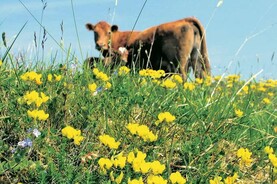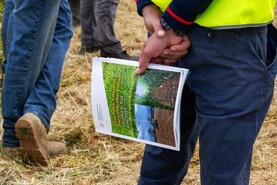The Minister for Agriculture has urged the public to take their own biosecurity measures to protect the national herd from exotic animal diseases this summer.
Minister Martin Heydon was briefing the Cabinet on Tuesday about actions his Department is taking to protect Irish livestock from the threat of a disease outbreak.
Speaking specifically about foot-and-mouth disease (FMD), he advised people that have travelled abroad in an area affected by FMD (parts of Africa, Asia and the Middle East) to avoid contact with cattle, sheep, goats and pigs for 14 days after returning to Ireland including farm visits, open days and agri-tourism farms.
People are also urged to wash clothes and disinfect footwear if they came in contact with livestock while abroad.
Minister Heydon said Irish livestock is threatened by a number of very serious diseases close to our shores.
“The risk to Ireland from exotic animal diseases is higher now than at any time in the modern era,” he said.
“I am focussed on doing all we can to protect our animals, to protect the agri-food sector, and to deal with any outbreak effectively.”
Bluetongue
Bluetongue disease (BTV-3) has spread across Europe since 2023, and has reached the north-western coast of England.
More common during warmer months, the disease is carried by midges which bite livestock like sheep and cattle.
The importation of BTV-susceptible animals from Britain has been banned since November 2023. While animals may enter Ireland from BTV-free zones of other EU countries under certain strict certification conditions, no such movements have occurred since July 2024.
The Department of Agriculture will also be holding meetings with officials from Northern Ireland and stakeholders to raise awareness and prepare for any cases.
“Climate change has increased the risk, as the midges transmit the virus only in warmer months. My Department is carrying out surveillance to detect any incursions as early as possible, and working with Met Eireann to see where infected midges from Great Britain or France may be blown by the wind into Ireland.”

A sheep with an ulcerative lesion in lower lip. The importation of BTV-susceptible animals from Britain has been banned since November 2023.
Bird flu
The H5N1 strain of avian influenza has been detected in a number of wild birds across the country, while in Northern Ireland, there were three outbreaks in poultry farms in February.
The Minister has announced that biosecurity measures around bird flu will be lifted on Saturday 31 May. This comes after a poultry housing order was lifted earlier in the month.
“We are now out of the higher risk winter period for this disease, but we expect an ongoing level of risk even in the summer months.
“This is a disease which does not just threaten poultry; it also poses a very serious risk to human health.”
Advice
In addition, people are advised not to feed food waste to pigs or any animals as that can be a source of several animal diseases
“The actions I have taken cannot eliminate these risks or guarantee that we will escape an outbreak; the risks are real and are not going away.
“But by communicating how to protect our livestock, by raising awareness, by carrying out targeted early warning surveillance, and by working across Government and with partners internationally, my actions give confidence that we are prepared and ready.”
Read more
Bird flu biosecurity regulations to be lifted
Five top tips for herd health plans
Bluetongue zone to extend to all of England
Prepping animal housing for health
The Minister for Agriculture has urged the public to take their own biosecurity measures to protect the national herd from exotic animal diseases this summer.
Minister Martin Heydon was briefing the Cabinet on Tuesday about actions his Department is taking to protect Irish livestock from the threat of a disease outbreak.
Speaking specifically about foot-and-mouth disease (FMD), he advised people that have travelled abroad in an area affected by FMD (parts of Africa, Asia and the Middle East) to avoid contact with cattle, sheep, goats and pigs for 14 days after returning to Ireland including farm visits, open days and agri-tourism farms.
People are also urged to wash clothes and disinfect footwear if they came in contact with livestock while abroad.
Minister Heydon said Irish livestock is threatened by a number of very serious diseases close to our shores.
“The risk to Ireland from exotic animal diseases is higher now than at any time in the modern era,” he said.
“I am focussed on doing all we can to protect our animals, to protect the agri-food sector, and to deal with any outbreak effectively.”
Bluetongue
Bluetongue disease (BTV-3) has spread across Europe since 2023, and has reached the north-western coast of England.
More common during warmer months, the disease is carried by midges which bite livestock like sheep and cattle.
The importation of BTV-susceptible animals from Britain has been banned since November 2023. While animals may enter Ireland from BTV-free zones of other EU countries under certain strict certification conditions, no such movements have occurred since July 2024.
The Department of Agriculture will also be holding meetings with officials from Northern Ireland and stakeholders to raise awareness and prepare for any cases.
“Climate change has increased the risk, as the midges transmit the virus only in warmer months. My Department is carrying out surveillance to detect any incursions as early as possible, and working with Met Eireann to see where infected midges from Great Britain or France may be blown by the wind into Ireland.”

A sheep with an ulcerative lesion in lower lip. The importation of BTV-susceptible animals from Britain has been banned since November 2023.
Bird flu
The H5N1 strain of avian influenza has been detected in a number of wild birds across the country, while in Northern Ireland, there were three outbreaks in poultry farms in February.
The Minister has announced that biosecurity measures around bird flu will be lifted on Saturday 31 May. This comes after a poultry housing order was lifted earlier in the month.
“We are now out of the higher risk winter period for this disease, but we expect an ongoing level of risk even in the summer months.
“This is a disease which does not just threaten poultry; it also poses a very serious risk to human health.”
Advice
In addition, people are advised not to feed food waste to pigs or any animals as that can be a source of several animal diseases
“The actions I have taken cannot eliminate these risks or guarantee that we will escape an outbreak; the risks are real and are not going away.
“But by communicating how to protect our livestock, by raising awareness, by carrying out targeted early warning surveillance, and by working across Government and with partners internationally, my actions give confidence that we are prepared and ready.”
Read more
Bird flu biosecurity regulations to be lifted
Five top tips for herd health plans
Bluetongue zone to extend to all of England
Prepping animal housing for health







 This is a subscriber-only article
This is a subscriber-only article









SHARING OPTIONS: